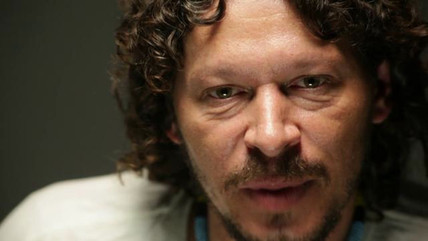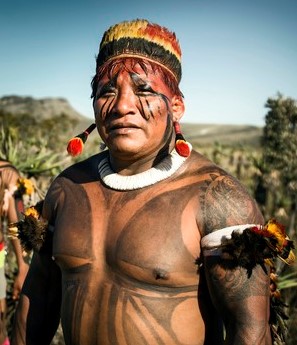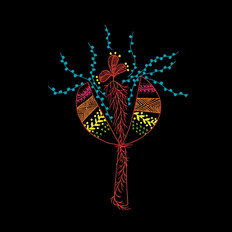
Indígenas.br - Indigenous Music Festival - Schedule 06/09
Day 06/09 – Monday – 7:00pm
Documentary show
— Interview with Anuiá Amarü — Direction: Charlie Crooijmans — BA — 2017
— Kukuho – Canto Vivo Waujá* – Direction: Takumã Kuikuro – MT – 2021
Music video show
— ORE MBORAI — Multiethnic Orchestra
Chat
— Musical exchanges between indigenous people — Renata Amaral, Anuiá Amarü (Multiethnic Orchestra) and Juliano Basso. Mediation: Magda Pucci.
Interview with Anuiá Amarü
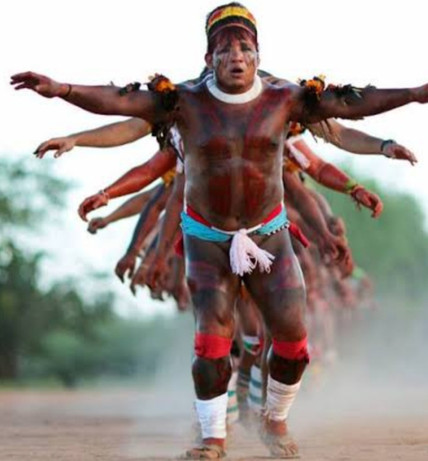
Interview with musician Anuiá Amarü, held in January 2017, in Imbassaí (BA) at the Meeting of Cultures Festival – Dancing for Peace – a multiethnic meeting with five different Brazilian indigenous cultures and cultures from abroad.
Anuiá comes from a family of shamans of two peoples of the Xingu: Kamayurá and Yawalapiti, being the eldest son of Maniwa Kamayurá, master of the arts and crafts of traditional knowledge. During the festival, Anuiá interacts with different musicians and dance teachers from different countries.
Interviewed by researcher and musician Magda Pucci and Dutch journalist Charlie Crooijmans, Anuiá Amarü plays his flute and explains how he learned to play the Kuluta flute and about his expertise in building the Xingu hollows.
Direction: Charlie Crooijmans
Year: 2017
Venue: Meeting of Cultures in Imbassai – Bahia
Genre: Interview
Editing, Assembly and Audio: Charlie Crooijmans
Kukuho - Wauja Live Song
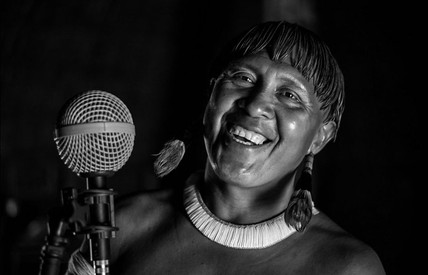
Recorded in the Topepeweké village of the Waujá people in the Xingu (MT), this video presents songs of the ritual of the cassava named Kukuho. The ritual coordinated by singer and researcher Akarí Waujá was filmed by award-winning filmmaker Takumã Kuikuro.
Kuikuro visits the Waujá village of Akari and films the singers of this important people of the Upper Xingu. Akari is a musician, storyteller and leader of the Waujá do Xingu community, located at the southern end of the Amazon basin, in Mato Grosso. A speaker of the Arawak family’s maipure language, Akari seeks to preserve and share the traditional music of his people by participating in teaching activities in villages where musical knowledge is almost extinct. Akari is teaching and documenting the songs that are part of the rituals and practices of Wauja culture and collaborates in indigenous cultural conservation projects.
Director: Takumã Kuikuro
Production Year: 2021
Genre: Musical
Rating: Free
Location: Xingu Indigenous Land
ORE MBORAI - Multiethnic Orchestra
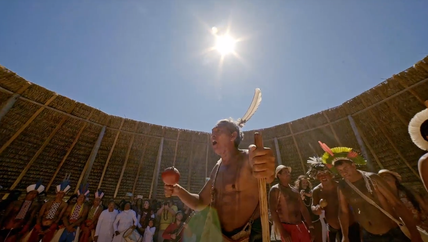
The Multiethnic Orchestra was an experience held in 2019, at Aldeia Multietnica, a space that has been home to one of the most important meetings of indigenous peoples in Brazil since 2007.
This orchestra brought together more than a hundred indigenous people from the Karajá, Krahó, Guarani, Fulni-Ô, Kayapó, Kariri-Xocó, Yawalapiti, Waujá, Kamayurá and Maxakali peoples. The result was a powerful and transformative artistic dialogue that is based on the concept of ORE MBORAI – our singing/praying, united in one voice.
There was a space for meeting, reflection and strengthening, which mobilized indigenous people and their knowledge, enabling integrated actions of creation, registration and training. The direction of this unique meeting was in charge of the musician and researcher Renata Amaral, from the group A Barca. All voices were heard and resonated collectively poetically.
Krahô
Music: Akru nõro ré (Liana lying down)
History: This song was brought by the elders. It talks metaphorically about the vine, which will grow, spread, lie down on the ground and grow even more. It is an allusion to the growth of the Krahô people themselves, calling for health and prosperity.
Main singer: Berlindo
Group: Huhkop (Berlindo), Iwao (Marli Miuda), Pyro (Magdalene)
Soloist: Kukon
Guarani Mbya
Song: Maino’î (Hummingbird)
History: Singing about the hummingbird, holy bird. It conducts thoughts, speeches, and teachings. According to the myth of origin, at the beginning of time the hummingbird flew away, but then returned to the sacred altar of Nhanderu.
“Everything is linked to music. We thank with our singing to the God who created us. When we sing together, we talk about strengthening. We’re connected. Nothing will beat us because we are together.”
Lead singer: Kuaray Papa
Group: Kuaray Papa (Fabiano), Vera Ropeju (Kleiton), Tupã (Osmar), Karaí (Reginaldo), Vera Miri (Anderson), Xaka (Carlos), Pope (Charles), Tataí (Juliana), Ara (Eliana), Reté (Michele), Yva (Niqueli), Kerexu (Kaiume), Ywww My Ju (Tainara),
Fulni-o
Song: Efekhla
History: Music that tells of ancestors, warriors who fought for the happiness of their descendants, and when it is sung, it is felt that these ancestors are satisfied. It speaks of the land, the forest, the energies.
Main singer: Towê
Group: Towé, Aritana, Yoran, Fythya, Naxia, Sawe, Ekya, Kelaya, Natxle, Fletutxya, Txiflaya, Otxaya, Tulni Fooa
Kayapo/Mebengôkré
Song: Baynhon Men Tôro
History: It tells the mythical story of an original corn foot, at a time when all peoples spoke the same language, and subsequently gave rise to the various languages of the various ethnic groups.
Group: Bepkaeti, Bekaroti, Hyrango, Nhakran, Axuape, Irebo, Dudu, Tu-î, Krio
Karajá
Music: Taxi ó toé tuké
History: Thank you singing (“Thank you for remembering us”).
Lead singer: Iraro
Group: Iarraro, Iykana, Asaria Wasabedu, Wereahunaxi, Axiawa, Buraxia, Kuriawa, Browari, Iwaru Kuriala
Kariri Xoco
Song: Kakará Tsy (Kakará Tsy)
History: The song of suffering, talks about the rooster who sings announcing the dawn and the time of departure.
Lead singer: Dizuka
Group: Dizuka, Kawyran, Kaapry, Naishe, Yuk, Kayté
Huni Kuin
Song: Maê Iuka Ikai (Where are we?)
History: Request for welfare and peace upon arrival in a new land.
Group: Siam (Pajé Sales), Isa Dewe, Bixku, Nawa Siam
Alto Xingu (Redes – bonfire – handicrafts of each people)
Music: Kahogo Igissü (I am the monkey)
History: It narrates the origin and evolution of the human being from the monkey.
Main singer: Anuiá Amaru
Group: Anuiá Amaru, Palaku Paulo, Kamukaiaka Lappa, Tupaga Hotugo, Uluche, Wayuni, Karina Machipu
Instruments: Taquara (flutes)
Maxakali
Song: Kunon Hip (Caterpillar)
Story: Song that refers to a myth of origin by the Maxakali
Group: Mamed, Alexandre, Cassiano and Eliane
Chat: Musical exchanges among indigenous people
Participants: Renata Amaral, Anuiá Amarü and Juliano Basso
Mediation: Magda Pucci
Based on the experience of the Meeting of Cultures of Chapada dos Veadeiros designed by Juliano Basso, in which indigenous people from all over Brazil gathered to sing and play together, this chat brings together musician-flutist Anuiá Amarü with the musician and articulator of the Renata Amaral Multiethnic Orchestra.
Anuiá Amarü
Flutist, artist and indigenous political articulist of the Yawalapiti people of the Xingu Indigenous Land. Anuiá comes from a family of shamans, being the eldest son of Maniwa Kamayurá, master of the arts and crafts of traditional knowledge of the peoples of the Upper Xingu. Along with important partners, he has been active in the context of cultural policies and plays an important role in the search for strengthening the knowledge of his people, and for the development of projects that increase the quality of life of native peoples. In addition to being a flutist, Anuiá specializes in building the traditional residence of his people and accumulates works scattered throughout various places, such as at the Memorial of Indigenous Peoples of Brasília, in a construction of the Niemeyer Oscar.
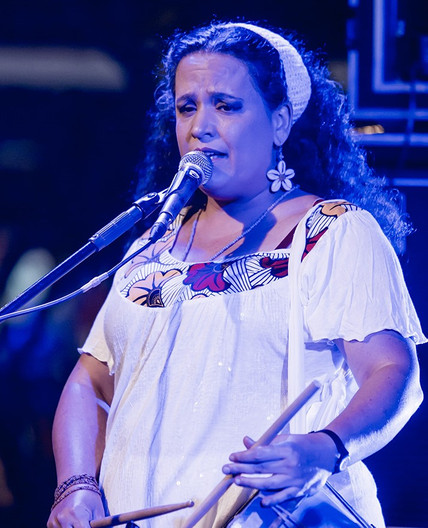
Renata Amaral
Graduated in composition and conducting, master and doctoral student in Musical performance from UNESP, she has performed throughout Brazil and Europe alongside artists such as A Barca, Ponto br, Tião Carvalho, Sebastião Biano, Orchestra Popular do Recife and others. Researcher and bass player, since 1991 he has gathered the Maracá Collection, having produced more than 30 CDs and 12 documentaries of traditional genres that have received several awards. He received the Funarte Aesthetic Interactions Award twice, conducting artistic residencies in Maranhão and Benin. Author of Pedra da Memória, with her groups A Barca and Ponto br, recorded 5 CDs and made more than 500 presentations in circulation, registration and art education projects. He teaches courses and workshops focusing on Traditional Culture in schools and universities. He coordinated the Multiethnic Orchestra at the Chapada dos Veadeiros Meeting.
